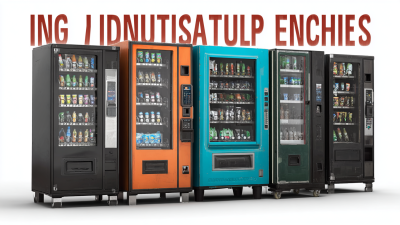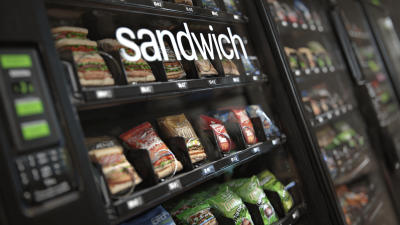Unlocking Efficiency with Industrial Vending Machines for Modern Manufacturing Solutions
In the ever-evolving landscape of modern manufacturing, the integration of technology has become crucial for enhancing operational efficiency and productivity. One innovative solution that stands out in this digital transformation is the implementation of industrial vending machines. These automated systems not only streamline the inventory management process but also significantly reduce downtime by ensuring immediate access to essential tools and materials. By leveraging real-time data and analytics, industrial vending machines empower manufacturers to optimize their stock levels, mitigate waste, and enhance overall supply chain management. As industries seek to navigate the complexities of today’s market, embracing such advanced solutions offers a pathway to unlocking unprecedented efficiency and driving sustainable growth. In this exploration, we will delve into the multifaceted benefits and transformative impact of industrial vending machines on manufacturing processes.

Understanding Industrial Vending Machines: Definition and Purpose
Industrial vending machines represent a pivotal innovation in modern manufacturing environments. At their core, these machines are automated systems designed to dispense tools, parts, and various supplies directly to employees on the shop floor. By utilizing advanced technology, they streamline the procurement process, ensuring that necessary items are readily available while minimizing excess inventory. This not only enhances productivity but also reduces operational costs associated with manual inventory management.
To make the most of industrial vending machines, consider implementing these tips. First, assess the specific needs of your workforce by analyzing usage patterns and the types of items that require frequent replenishment. Customizing your vending machine inventory to meet these demands can lead to substantial gains in efficiency. Second, leverage data analytics that many industrial vending machines offer. Regularly reviewing consumption data helps identify trends and informs purchasing decisions, allowing for more strategic investments. Lastly, ensure that training is provided for all employees on how to effectively use these machines, as proper utilization will ultimately drive continuous improvement in manufacturing processes.
With these strategies in place, industrial vending machines can significantly transform the way manufacturing operations handle their supply chain and inventory management.

Key Features of Modern Industrial Vending Solutions
Modern industrial vending solutions are revolutionizing the manufacturing sector by enhancing efficiency and streamlining inventory management. One of the key features of these vending machines is their ability to provide real-time inventory tracking. According to a report from the Industry Research Institute, companies implementing advanced vending solutions have seen a 30% reduction in excess inventory, allowing businesses to optimize stock levels and minimize waste. This capability not only reduces costs but also ensures that essential tools and materials are readily available when needed, thus boosting productivity on the shop floor.
Another significant advantage of industrial vending machines is their integration with advanced data analytics. By collecting and analyzing usage patterns, companies can make informed decisions regarding procurement and inventory replenishment. A survey by VendingMarketWatch indicates that organizations utilizing data-driven vending solutions report a 20% increase in operational efficiencies. Companies can also leverage this data to forecast needs accurately, reducing downtime caused by equipment shortages. With customizable features and secure access controls, modern vending machines adapt to various manufacturing environments, making them an essential component of today's production strategies.
Benefits of Implementing Vending Machines in Manufacturing
In today's fast-paced manufacturing landscape, the integration of industrial vending machines has emerged as a game-changer, enhancing operational efficiency significantly. According to a report by the Industrial Distribution Association, companies that utilize vending machines see a 30% reduction in tool and supply costs due to efficient inventory management. This consolidation of resources allows manufacturers to streamline their operations while minimizing waste.
Moreover, the implementation of vending machines directly impacts workforce productivity. A study by the National Association of Manufacturers indicates that up to 25% of manufacturing downtime is caused by employees searching for tools and materials. By automating the procurement process with vending machines, companies can ensure that workers have immediate access to necessary supplies, thus reducing idle time. The convenience and efficiency of these systems not only improve workflow but also lead to higher employee satisfaction, as workers can spend more time on their core tasks rather than in search of materials.
Challenges and Considerations for Industrial Vending Machine Integration
The integration of industrial vending machines into modern manufacturing solutions represents a significant advancement in supply management efficiency. Recent industry reports indicate that the global industrial vending machine market is projected to experience substantial growth, expanding from approximately USD 1.25 billion in 2022 to an estimated USD 2.5 billion by 2030. This upward trend underscores the economic importance of these machines in optimizing inventory control and reducing operational downtimes. However, the successful implementation of vending machines within industrial settings entails navigating several challenges and considerations.
Key issues include the need for seamless integration with existing inventory management systems and addressing potential resistance from staff accustomed to traditional inventory practices. Moreover, companies must evaluate the costs associated with purchasing and maintaining these machines, balancing initial investments against long-term savings. Stakeholder collaboration is critical to overcoming these hurdles, ensuring that all departments understand the value proposition of adopting high-tech vending solutions. By proactively addressing these challenges, manufacturers can unlock the full potential of industrial vending machines, paving the way for enhanced operational efficiencies and significant economic returns.
Performance Metrics of Industrial Vending Machines
Future Trends in Industrial Vending for Enhanced Manufacturing Efficiency
 The landscape of industrial vending is rapidly evolving, driven by the need for enhanced manufacturing efficiency. With the integration of advanced technologies such as artificial intelligence and IoT, modern manufacturing solutions are becoming more automated and efficient. Industrial vending machines are not merely a means of distribution; they are pivotal in managing inventory levels, ensuring the availability of critical materials, and reducing downtime on the production floor. This shift towards smart vending systems reflects a broader trend in manufacturing where real-time data and automated processes are paramount.
The landscape of industrial vending is rapidly evolving, driven by the need for enhanced manufacturing efficiency. With the integration of advanced technologies such as artificial intelligence and IoT, modern manufacturing solutions are becoming more automated and efficient. Industrial vending machines are not merely a means of distribution; they are pivotal in managing inventory levels, ensuring the availability of critical materials, and reducing downtime on the production floor. This shift towards smart vending systems reflects a broader trend in manufacturing where real-time data and automated processes are paramount.
As manufacturers increasingly adopt these systems, the future of industrial vending is poised for growth. The market is expected to see significant advancements in areas such as predictive analytics and inventory management, which will allow for more proactive decision-making. Furthermore, the seamless integration of industrial sensors will enable continuous monitoring of supply levels and usage patterns, enhancing operational efficiency. This transition towards a more interconnected manufacturing environment not only boosts productivity but also supports sustainability efforts by minimizing waste and optimizing resource allocation. The evolution of industrial vending machines serves as a testament to the innovative spirit driving modern manufacturing forward.
Related Posts
-

10 Tips for Choosing the Best Industrial Vending Machines for Your Business
-

Discover the Advantages of the Best Soda Vending Machine for Your Business
-

Exploring the Future of Best Smart Vending Machines Market Trends and Examples for 2025
-

Solutions for Boosting Revenue with the Best Sandwich Vending Machines Worldwide
-

Maximizing ROI with Exceptional After-Sales Support for the Best Sandwich Vending Machines
-

Revolutionizing Convenience: The Global Success of China’s Best Smart Vending Machines
